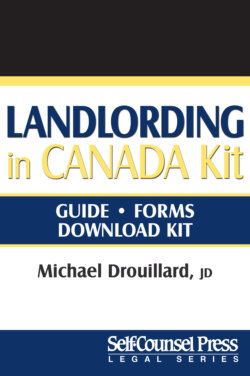Читать книгу Landlording in Canada - Michael Drouillard - Страница 35
На сайте Литреса книга снята с продажи.
Legislation designed to protect personal information
ОглавлениеAs a landlord, you are in the privileged position of having access to very personal financial information from tenants and tenant applicants. The typical application form requires a tenant to disclose everything from a social insurance number to the addresses of all of the rental homes the tenant has resided in for the past few years. Not surprisingly, most provinces have laws that require landlords to safeguard information they obtain from tenants. Failing to do so exposes the landlord to sanctions ranging from penalties imposed by the province’s privacy commissioner, to a damages claim from the tenant.
Again, you should be reviewing your province’s privacy commissioner’s website to see if it has any advice for landlords. Generally speaking, these laws will require you to do as follows.
1. Never collect personal information from your tenant unless you have a valid business purpose for doing so.
This means, for example, that your rental application should only ask questions needed to help you assess whether the tenant is financially qualified to rent your property. Nothing more. Asking for information needed to let you perform a credit check is an example of a valid business purpose as well as asking for the tenant’s rental history.
Asking if the tenant has a university degree, on the other hand, is not a valid business purpose. How does this help you determine if the tenant can afford to rent your property? It doesn’t help you very much at all. You shouldn’t collect such information.
You also shouldn’t collect more information than you need to assess the tenant’s application. For example, some out-of-date application forms will ask tenancy applicants to provide banking information such as the locations of all of the tenant’s bank accounts as well as the bank account numbers. This information, while interesting, does not help you determine if the tenant is financially qualified to rent your property. Do not collect such information.
2. Never use personal information collected from your tenant for a reason other than what is stated to the tenant.
A good application form will state the reason why the tenant’s personal information is being collected, i.e., to assess the tenant’s suitability to rent the property and, if the tenancy is accepted, to manage the tenancy and to enforce obligations that may arise under the tenancy agreement.
Once you have collected personal information for this purpose, do not use it for anything else. Do not, for example, share such information with your friends or colleagues at work. Do not start a blog describing all of your wonderfully qualified tenants in great detail. This sort of practice will easily lead to trouble for the landlord.
3. Keep personal information you collect from your tenant safe and destroy the information when you are no longer required to keep it by law.
Personal information you collect should be safeguarded. Physical douments such as completed tenancy application forms should be under lock and key. Electronic information you collect should be password protected.
You should always retain personal information when you have a legal need to keep it. What if, for example, a tenant you declined to rent to decides to come back a year later with a baseless human rights complaint? You need to have the personal information you collected from the tenant available to protect yourself.
However, when you no longer have a legal need to keep the information, such as after the limitation period has expired for a tenant to initiate legal action against you has expired, it should be destroyed.
